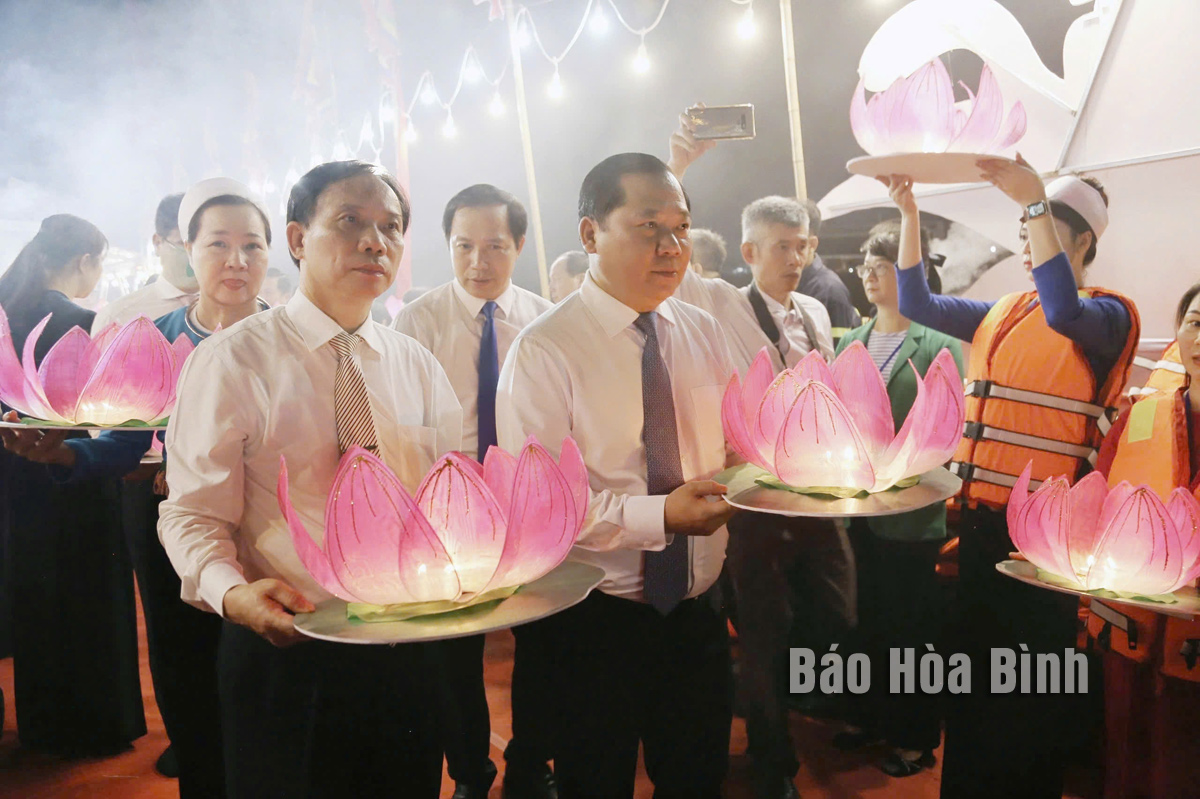
As part of the second Da River fish and shrimp festival in Hoa Binh province, the provincial People's Committee on November 15 held a fish worship ceremony and released lanterns on Da River.
alternate member of the Party Central Committee and Secretary of the provincial Party Committee Nguyen Phi Long and delegates attend the fish worship ceremony and release lanterns on Da River.
In his opening speech, Vice Chairman of the provincial People's Committee and head of the festival organising committee Dinh Cong Su said the fish worship ceremony and lantern release on the Da river holds spiritual significance. Its purpose is to pray for peace, national prosperity, favourable weather for bumper harvests, and express gratitude to those who have contributed to the fisheries industry. It also aims to preserve and promote the cultural values and traditions of ethnic groups.
Later, local shamans conducted the fish worship ritual, and local leaders and a large gathering of residents performed the ritual of releasing lanterns.
The festival, which officially opened on November 19, featured a plethora of engaging activities. Among the highlights was an agricultural forum hosted by the Ministry of Agriculture and Rural Development, focusing on the promotion of agriculture linked to tourism, green growth and sustainable development.
On November 20, the festivities continued with a thrilling sport fishing competition on Da River, complemented by cultural promotion activities that showcased the stunning landscape of Hoa Binh reservoir. In a symbolic gesture of environmental stewardship, fish were released into the lake to replenish its fishery resources.
Hoa Binh province is undergoing a dynamic transformation amid Vietnam’s national digital transition. Building on Poliburo’s Resolution No. 57-NQ/TW on breakthroughs in science, technology, innovation, and national digital transformation, the province has rolled out a wide range of practical action plans. A standout initiative is the "Digital Literacy for All” movement, an effort to ensure that no one is left behind in the digital era.
Hoa Binh province is undergoing a dynamic transformation in the wake of the national digital transformation movement. Building on Resolution No. 57-NQ/TW of the Politburo on breakthroughs in science, technology, innovation, and national digital transformation, the province has implemented a wide range of practical action plans. A standout initiative is the "Digital Literacy for All” movement ambitious effort to ensure that no one is left behind in the digital age.
With a spirit of unity and proactive problem-solving, the Party Committee, the government and the people of Dong Lai Commune (Tan Lac District) have made great strides in implementing the resolutions of the 24th Party Congress of the commune for the 2020 - 2025 term. Focusing on leadership and practical actions, the commune has brought the Party’s resolutions into daily life, creating strong impacts and pushing the local development forward.
Amid the nationwide push for digital transformation, young people in Hoa Binh Province are stepping up as dynamic pioneers, applying technology to enhance Youth Union operations and expand the reach of youth-led initiatives. Through creativity and adaptability, Youth Union organizations at all levels have introduced a series of practical solutions, contributing to modern governance and community development.
In recent years, An Nghia commune, located in Lac Son district, has stepped up administrative reform, focusing on improving the quality and efficiency of its single-window service unit for receiving and processing administrative procedures. These improvements have helped create favourable conditions for local residents and organisations to handle administrative procedures, contributing to the commune’s broader socio-economic development.
The Prime Minister-approved master plan to develop the multi-use value of forests ecosystems through 2030, with a vision to 2050, aims to improve the management and sustainable use of forest resources, create jobs, increase incomes, and improve the living standards of ethnic minorities, people in mountainous and remote areas, forest workers and those living near forests.



